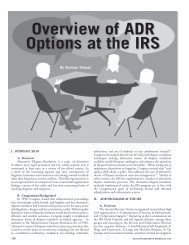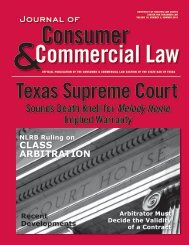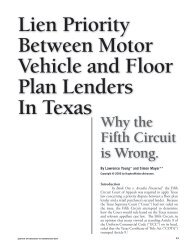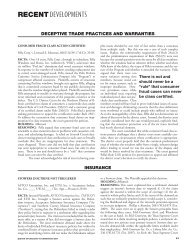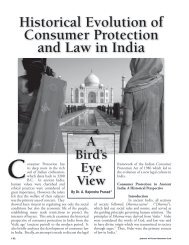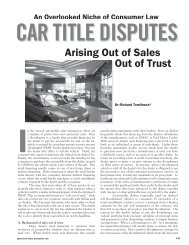Teaching Consumer Credit Law in an Evolving Australian Economy
Teaching Consumer Credit Law in an Evolving Australian Economy
Teaching Consumer Credit Law in an Evolving Australian Economy
Create successful ePaper yourself
Turn your PDF publications into a flip-book with our unique Google optimized e-Paper software.
“…[W]hile there is some debate about the role of university education, it is generally agreed<br />
that the basic function of a law school is to prepare students for the practice of law…<strong>an</strong>d that<br />
legal education should focus on what lawyers need to be able to do.” 1<br />
Australi<strong>an</strong> consumer <strong>an</strong>d credit law has<br />
experienced a metamorphosis with the<br />
implementation of the National <strong>Consumer</strong><br />
<strong>Credit</strong> Protection Package (NCCPP) 2 <strong>an</strong>d the<br />
Australi<strong>an</strong> <strong>Consumer</strong> <strong>Law</strong> (ACL). The scale<br />
of these developments has necessitated that<br />
Australi<strong>an</strong> consumer law academics review (<strong>an</strong>d subst<strong>an</strong>tially<br />
rewrite) their courses <strong>an</strong>d, <strong>in</strong> some cases, reconsider traditional<br />
teach<strong>in</strong>g approaches. Aga<strong>in</strong>st a background of a “patchwork”<br />
domestic economy <strong>an</strong>d l<strong>in</strong>ger<strong>in</strong>g global f<strong>in</strong><strong>an</strong>cial uncerta<strong>in</strong>ty, it is<br />
more import<strong>an</strong>t th<strong>an</strong> ever to l<strong>in</strong>k course content to contemporary<br />
events <strong>an</strong>d highlight the signific<strong>an</strong>t role that <strong>Consumer</strong> <strong>Law</strong> plays<br />
<strong>in</strong> these unfold<strong>in</strong>g events.<br />
This paper focuses on a <strong>Consumer</strong> <strong>Credit</strong> Practicum that<br />
has been developed by the <strong>Consumer</strong> <strong>Law</strong> teach<strong>in</strong>g team on<br />
the Faculty of <strong>Law</strong> at the University of Western Australia. 3 The<br />
Practicum was developed to enh<strong>an</strong>ce the study of <strong>Consumer</strong><br />
<strong>Credit</strong> <strong>Law</strong> <strong>in</strong> the undergraduate law curriculum. The project<br />
was undertaken for two reasons. First, the scale of the NCCPP<br />
reforms necessitated a wholesale review of the consumer credit<br />
component of the consumer law course. This review revealed<br />
that more time would be required to teach consumer credit law<br />
<strong>in</strong> a me<strong>an</strong><strong>in</strong>gful way. Second, the UWA <strong>Law</strong> School has not,<br />
until relatively recently, embraced practical components <strong>in</strong> most<br />
undergraduate units. 4 The Practicum was regarded as a step <strong>in</strong><br />
this somewhat neglected direction.<br />
Practical Skills With<strong>in</strong> the <strong>Law</strong> School Curriculum<br />
The face of legal education <strong>in</strong> Australia is evolv<strong>in</strong>g. 5 There is<br />
pressure to provide quality professional education with<strong>in</strong> <strong>an</strong><br />
environment of shr<strong>in</strong>k<strong>in</strong>g budgets <strong>an</strong>d ris<strong>in</strong>g student numbers.<br />
Increas<strong>in</strong>gly, students expect that they graduate “work-ready”<br />
<strong>an</strong>d, more <strong>an</strong>d more, legal firms are dem<strong>an</strong>d<strong>in</strong>g the same. Indeed,<br />
research <strong>in</strong>to legal education has noted the efficacy of us<strong>in</strong>g the<br />
acquisition of work skills as a framework for org<strong>an</strong>iz<strong>in</strong>g the legal<br />
curriculum. 6 Practical legal skills are <strong>an</strong> essential part of such a<br />
framework. 7<br />
Such views are reflected <strong>in</strong> recent enquiries <strong>in</strong>to legal<br />
education <strong>in</strong> Australia <strong>an</strong>d abroad. In 2007, Best practices for<br />
legal education: A vision <strong>an</strong>d a road map (the Stuckey report)<br />
recommended a number of best practices <strong>in</strong> legal education,<br />
m<strong>an</strong>y of which referred to legal skills. 8 More recently, Educat<strong>in</strong>g<br />
<strong>Law</strong>yers - Preparation for the Profession of <strong>Law</strong>, a report from the<br />
Carnegie Foundation for the Adv<strong>an</strong>cement of <strong>Teach<strong>in</strong>g</strong>, called<br />
for <strong>in</strong>tegrated learn<strong>in</strong>g experiences, which comb<strong>in</strong>e the teach<strong>in</strong>g<br />
of legal doctr<strong>in</strong>e, legal skills <strong>an</strong>d professional identity. 9 In this<br />
respect it has been noted recently that:<br />
This report re<strong>in</strong>forced what m<strong>an</strong>y <strong>in</strong> the legal academy believe<br />
about the traditional curriculum <strong>in</strong> Americ<strong>an</strong> law schools: that<br />
law schools have focused too much on teach<strong>in</strong>g students to “th<strong>in</strong>k<br />
like lawyers” <strong>an</strong>d not enough on apply<strong>in</strong>g those th<strong>in</strong>k<strong>in</strong>g skills <strong>in</strong><br />
the complexity of professional practice or on other critical social<br />
skills necessary for effective practitioners. 10<br />
In <strong>an</strong> Australi<strong>an</strong> context, similar discussions have been<br />
tak<strong>in</strong>g place for some time. For example, <strong>in</strong> 1999 the Australi<strong>an</strong><br />
<strong>Law</strong> Reform Commission 11 noted that legal education should<br />
focus on what lawyers need to be able to do rather th<strong>an</strong> on what<br />
they need to know. 12 It was noted that cl<strong>in</strong>ical <strong>an</strong>d high-order<br />
skills tra<strong>in</strong><strong>in</strong>g programs were required to supplement classroom<br />
<strong>in</strong>struction on subst<strong>an</strong>tive law, <strong>an</strong>d to provide students with <strong>an</strong><br />
appreciation of the nature of “law as it is actually practiced”—<br />
<strong>in</strong>clud<strong>in</strong>g the social dimension <strong>an</strong>d the ethical dilemmas which<br />
may arise. 13<br />
In the not too dist<strong>an</strong>t past, Australi<strong>an</strong> law school curriculums<br />
were predom<strong>in</strong><strong>an</strong>tly doctr<strong>in</strong>al, with the responsibility of impart<strong>in</strong>g<br />
professional skills relegated to practice courses or legal firms dur<strong>in</strong>g<br />
clerkship. The past 20 years have seen a heightened recognition of<br />
the desirability of teach<strong>in</strong>g skills with<strong>in</strong> undergraduate programs,<br />
although putt<strong>in</strong>g this ideal <strong>in</strong>to practice is <strong>in</strong>consistent. Some<br />
universities offer a comprehensive cl<strong>in</strong>ical experience through onsite<br />
legal cl<strong>in</strong>ics, 14 or placements <strong>in</strong> community legal centers 15 or<br />
law firms. 16 Others may <strong>in</strong>corporate skills with<strong>in</strong> units <strong>in</strong> vary<strong>in</strong>g<br />
ways. At the other end of the spectrum, m<strong>an</strong>y law schools offer<br />
little <strong>in</strong> the way of practical experience. 17 It is fair to say that, to<br />
date, UWA has been one of the latter <strong>in</strong>st<strong>an</strong>ces. The approach<br />
has been very traditional <strong>an</strong>d “black letter”; the exception be<strong>in</strong>g<br />
the excellent “Commercial Practice” <strong>an</strong>d “Procedure” units<br />
undertaken <strong>in</strong> the f<strong>in</strong>al year of the undergraduate program.<br />
Although these latter units are comprehensive <strong>an</strong>d taught by<br />
experienced practitioners, the problem is that there have been few<br />
practical or cl<strong>in</strong>ical activities <strong>in</strong> other units. The consumer credit<br />
practicum is a small step <strong>in</strong>, what the consumer law teach<strong>in</strong>g team<br />
regards as, the right direction. 18<br />
The <strong>Consumer</strong> <strong>Credit</strong> Practicum – An Overview<br />
The <strong>Consumer</strong> <strong>Credit</strong> Practicum seeks to enh<strong>an</strong>ce <strong>an</strong>d enliven<br />
student learn<strong>in</strong>g by import<strong>in</strong>g a practical, case-based component<br />
<strong>in</strong>to the undergraduate consumer law unit. <strong>Consumer</strong> credit<br />
legislation <strong>an</strong>d case law are import<strong>an</strong>t elements of the consumer<br />
law unit. Their <strong>in</strong>clusion as a practical component will necessarily<br />
me<strong>an</strong> students will need to research, underst<strong>an</strong>d <strong>an</strong>d apply the<br />
law to real life situations. Groups of four students are required<br />
to familiarise themselves with a particular aspect of subst<strong>an</strong>tive<br />
consumer credit law while work<strong>in</strong>g through a simulated file, from<br />
<strong>in</strong>itial <strong>in</strong>structions to a f<strong>in</strong>al letter of advice. The consumer credit<br />
practicum runs alongside the tutorial program over a period of<br />
eight weeks. As well as requir<strong>in</strong>g students to work through the<br />
relev<strong>an</strong>t law, the project <strong>in</strong>troduces a variety of basic legal skills,<br />
such as client <strong>in</strong>terview<strong>in</strong>g, file m<strong>an</strong>agement, <strong>an</strong>d draft<strong>in</strong>g letters<br />
of advice. Other desirable skills, such as time m<strong>an</strong>agement,<br />
communication, <strong>an</strong>d work<strong>in</strong>g with<strong>in</strong> a team will also be <strong>in</strong>tegral<br />
to the project.<br />
As <strong>an</strong> <strong>in</strong>terest<strong>in</strong>g aside, the practicum has been <strong>in</strong>troduced<br />
dur<strong>in</strong>g a period of considerable national <strong>an</strong>d <strong>in</strong>ternational tension<br />
regard<strong>in</strong>g the misuse of credit, <strong>an</strong>d <strong>in</strong> <strong>an</strong> Australi<strong>an</strong> context, <strong>an</strong><br />
almost unprecedented overhaul of consumer <strong>an</strong>d consumer credit<br />
laws. It is <strong>in</strong>structive at this stage, therefore, to provide some<br />
expl<strong>an</strong>ation of the recent developments <strong>in</strong> the Australi<strong>an</strong> legal<br />
l<strong>an</strong>dscape <strong>in</strong> relation to consumer credit.<br />
Recent Developments <strong>in</strong> Australi<strong>an</strong> <strong>Consumer</strong> <strong>an</strong>d <strong>Consumer</strong><br />
<strong>Credit</strong> <strong>Law</strong> – An Overview<br />
<strong>Consumer</strong> <strong>Credit</strong><br />
In this context it is useful to note that although Australia<br />
did not suffer the worst of the Global F<strong>in</strong><strong>an</strong>cial Crisis, Australi<strong>an</strong>s<br />
have <strong>in</strong>creas<strong>in</strong>gly become <strong>in</strong>debted through credit taken out for,<br />
Journal of <strong>Consumer</strong> & Commercial <strong>Law</strong> 3



